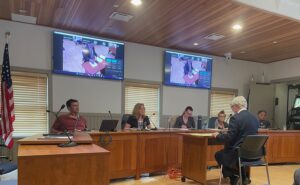TRURO — When the polls closed on Tuesday night and Truro’s new electronic vote tabulator printed the results, the tallies showed that select board chair Sue Areson had been re-elected, but three other incumbent town officials had been defeated.

Select board vice chair Bob Weinstein lost his re-election bid to former select board member John Dundas, who had declined to run for re-election last year.
Truro Planning Board member Paul Kiernan and clerk Jack Riemer both lost their seats to challengers Harlen Howard and Eric Jansen. Jansen announced a last-minute write-in campaign after town meeting on May 3.

Roughly 30 percent of Truro’s 2,333 registered voters turned out for the election, according to preliminary results from Town Clerk Nicole Tudor.
On the 700 ballots tallied in the town’s unofficial results, Areson got 585 votes while Dundas got 490 and Weinstein 183. This will be Areson’s third term on the select board and Dundas’s second; Weinstein has served four three-year terms and was running for a fifth.
In the planning board race, the unofficial tally showed Howard with 395 votes, Kiernan with 267, and Riemer with 249. Jansen had 334 write-in votes, according to Tudor’s tally.
Official results will be posted online later this week, Tudor told the Independent.
“Turnout was high, so I think that says a lot,” Howard said after the polls closed. “I just hope people think I do a good job.” He had campaigned on a platform of respect for applicants, advancing the town’s housing efforts, and keeping planning board discussions orderly and on task.
Jansen, owner of the restaurant Blackfish on Truro Center Road, said his decision to run had been some time in the making. “I’ve put this off and made excuses for a long time,” he said. “I’m ready to dive into the deep end and really immerse myself.”

The town has a housing crisis, Jansen told the Independent when he announced his campaign. “I feel fortunate and humbled that I’m given the opportunity to do this,” he said on election night.
Both Jansen and Howard said they wanted to see more collaboration and less combativeness on the seven-member planning board.
In the only other contested race, Mary Abt was re-elected to the board of library trustees with 421 votes. She faced a challenge from Ann Courtney, a member of Friends of the Truro Library, who received 210 votes.
Three other races on the ballot were uncontested. Betty Gallo, the housing authority’s current chair, was elected to a second five-year term with 546 votes. At candidates night on May 6, Gallo said she plans to focus on “actually getting homes for people,” including at the town-owned Walsh property.
Truro Police Sergeant Thomas Roda won a cemetery commission seat being vacated by Dundas with 582 votes, and paralegal Janina Richey was elected to the school committee with 542 votes.
Ballot Questions
Voters also approved four Proposition 2½ debt exclusions, which authorize the town to borrow money for capital expenditures but do not permanently raise the town’s tax levy. All four measures had passed easily at town meeting on May 3, and voters approved them again by large margins.

Question 1 asked voters to authorize $3.2 million in borrowing to “mitigate the migration of per- and polyfluoroalkyl substances (PFAS) identified in soil and groundwater” at the Dept. of Public Works facility at Town Hall Hill; 510 voters supported the measure while 152 opposed it.
The numbers were almost the same for the next three debt exclusion votes: $200,000 for stormwater improvements along Pond Road was approved 516 to 145, while $250,000 for repairs to the HVAC system at Truro Central Schools was approved 540 to 127.

The largest expenditure on the ballot — authorizing up to $5 million in borrowing to install large-scale solar power projects on town properties — passed with 508 votes in favor and 155 votes against.
Finally, an advisory question at the end of the ballot won more “yes” votes than any other question or candidate. The nonbinding measure called on state officials to require Holtec, the company that is decommissioning the Pilgrim Nuclear Power Station, to “immediately cease the gaseous discharge of the radioactively and chemically contaminated industrial wastewater” at the site. Six hundred two voters supported that measure, while 53 voted against it.




